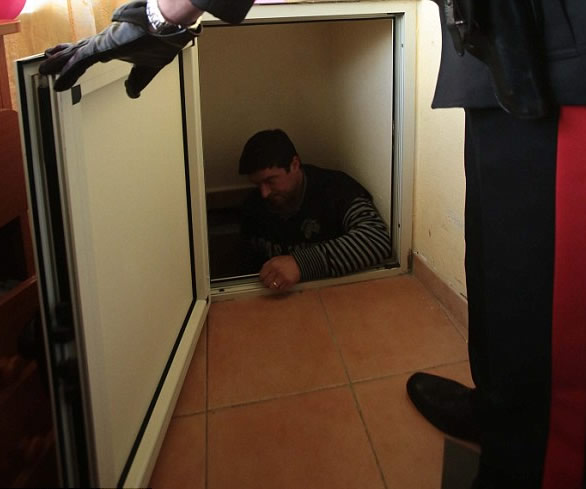 |
| Security specialist, trapman |
As important to organized crime as hit men or respectable business fronts, the trapman provides rich mobsters with psychological well-being—via readily accessible hiding places for funds. This security specialist builds traps or secret panels or hidden safes. Very few top mob leaders do not make use of such traps in either their homes and/or their offices.
Many years after Bugsy Siegel was murdered in Beverly Hills and his Flamingo Hotel in Las Vegas sold to other interests, a hidden safe was found in the hotel floor. Siegel had undoubtedly used the safe to hide much of the operating and building funds he'd skimmed off and indeed hidden from his underworld partners. It was empty when discovered and since Bugsy had expired too suddenly to have emptied it himself, someone who knew about the trap must have done it—or a trapman had talked to the mob.
Mobsters have a passionate dislike for safety deposit boxes—at least, in this country—and not all of them truly trust the Swiss or Bahamian banks with all their wealth. They like to keep their funds close at hand, often in concealed safes which also hold vital records and arms caches.
  |
Their houses often contain phony walls or even panels in swimming pools. One important mobster who maintained a close financial arrangement with Meyer Lansky, the late Trigger Mike Coppola, was said to have kept at least $300,000 stashed in various traps in his Alton Road home in Miami Beach.
Mobsters demand very sophisticated traps, such as a trap built behind a trap, a fireproof trap inside a stove or furnace, or one with an opening mechanism that can only be triggered in another room located often on another floor than the actual trap.
The trapman tends to be a non-crime person, pledged to secrecy. Since only the trapman and his client know of the trap, the security specialist has two vital reasons to maintain his silence: He likes the high pay he gets for his work and, even more important, he wants to stay alive. If a trap is busted, the trapman is the logical suspect.
Top trapmen do work for non-syndicate clients as well. Doctors and dentists, notorious for saving their "non-taxable" $100 bills, also feel unsafe with bank safe deposit boxes—which can be opened by tax authorities. Thus they prefer to keep traps in their homes.
Ethically, the only time a trapman is allowed to break his silence is if his client suddenly dies. Then, the trapman is allowed to come forward and reveal the trap to the dead man's associates—even to associates who may have conspired in the victim's death. If the trap is found to contain money, the trapman, under the mob's special code, is entitled to a percentage of the find.